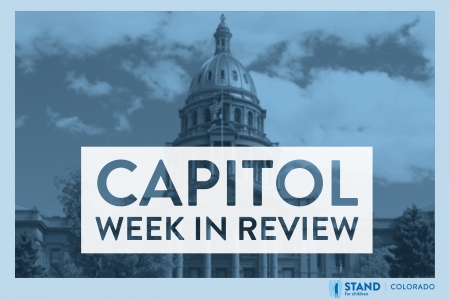HB23-1100, Restrict Government Involvement in Immigration Detention, was heard (and passed 7-6) by the House Judiciary Committee February 7. For years, Colorado taxpayers have been picking up the bill of the federal government by allowing the state to contract a private company to house or detain individuals for federal civil immigration purposes. This bill would prevent any such further contracts and begins a review process of these contracts over the next two years. Below is the testimony of Vallerie Bustamante.
Good afternoon, Chair, and members of the House Judiciary Committee. Thank you for taking the time to listen to my testimony today. I am here to ask you to vote in favor of HB23-1100.
I actually come here to ask for your vote not only as a community organizer for Stand for Children, but also as a friend, a granddaughter, a niece, a cousin, and most importantly as a daughter of Mexican immigrants. As a first generation everything, immigration reform has always been at the top of my mind, literally. Growing up with the fear that my parents or any extended family member would end up detained and sent off to a facility where living conditions are evidently inhumane, was probably the first thought that crossed my mind as I woke up, as I overachieved in school, as I was thinking of what college to attend, as I applied to my first job at 15 to help with bills because my mom was laid off due to a warning about ICE coming to her factory, as I watched the news with anticipation whenever the highlight said “immigration reform”. Although an end all be all immigration reform has not been passed, legislation like the one presented today is certainly a step forward towards that direction.
It is a step toward making it known —even though it saddens me that we still have to say it out loud– that human beings regardless of status—should not have a dollar sign above their head. When creating these lucrative incentives for local governments and private local jails or companies to house and maintain detainees, we are NOT fixing the problem, folks. This decades long problem in the US, where we see lack of resources, lack of internal oversight and accountability in federal immigration agencies is only being transferred to another setting when local governments and private companies open up facilities and contracts. Furthermore, Colorado taxpayer money is also being used for these facilities, which is unfair for your constituents.
There have been deaths, sexual assaults, lack of medical care in these detentions—and I guarantee you that 90% of them aren’t published in a newspaper for all of us to know about. But you know who finds out about how living conditions in a US facility can negatively affect a person? The daughter, the son, the mother, all of person’s loved ones. If we continue to consent to these agreements with federal agencies, we are only but accomplices to the pain that has been caused to so many.
So, lets ask ourselves that question—you may not have as close a connection as I do with immigration, but we all face injustices, and aren’t we all trying to fight against them?
Well, knowing a snippet of my story- you now know a little bit about the battle many people like me are trying to fight every day. By passing this bill—you’d be fighting with us and not against us. So again, I implore you to vote in favor of HB 23-1100.























